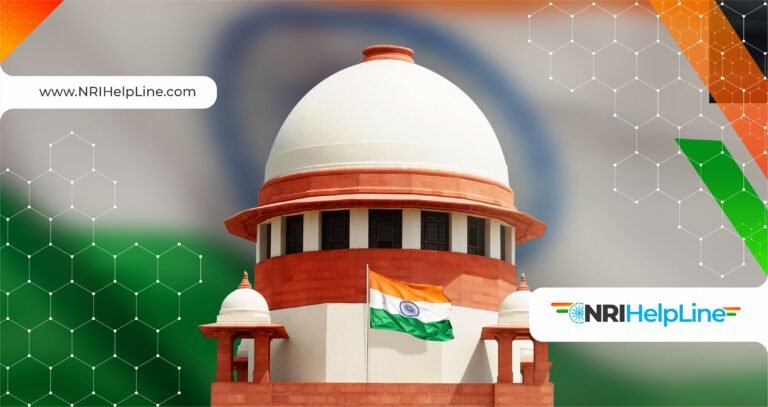NRI Divorce Laws are a crucial area of concern for Non-Resident Indians (NRIs) and Overseas Citizens of India (OCIs) who face legal challenges during divorce proceedings in India. Divorce is never an easy process, and for NRIs, it is often more complex due to the involvement of multiple legal jurisdictions, differing laws, and potential settlement issues. Understanding the intricacies of NRI Divorce Laws can help in navigating the legal process smoothly.
This guide explores the key aspects of NRI Divorce Laws, including jurisdictional issues, settlement options, and the legal provisions that govern divorce for NRIs in India. We’ll also cover the relevant sections of the Indian legal framework, including the Indian Income Tax Act, 1961, and Real Estate (Regulation and Development) Act, 2016, to explain how financial settlements and property disputes are handled.
NRI Divorce Laws | Understanding Jurisdiction and Legal Process
When NRIs or OCIs file for divorce, determining the appropriate jurisdiction is often the most critical aspect. Under NRI Divorce Laws, the jurisdiction depends on several factors, such as the place of marriage, the residence of both parties, and the nationality or domicile of the individuals involved.
1. Jurisdiction in NRI Divorce Cases
Under Section 19 of the Hindu Marriage Act, 1955, the place where the couple last resided together, or where the marriage was solemnized, can determine the court’s jurisdiction in India. Similarly, the Special Marriage Act, 1954 allows non-Hindu NRIs or OCIs to file for divorce under Indian law if they meet jurisdictional requirements.
For instance, if an NRI couple married in India, but currently resides abroad, they can file for divorce in India under NRI Divorce Laws if the marriage was registered in India or if one of the spouses is currently domiciled in India. However, if both spouses reside abroad, the Indian court may refuse to take jurisdiction unless exceptional circumstances apply.
2. Grounds for Divorce under NRI Divorce Laws
The grounds for divorce for NRIs remain largely similar to those for resident Indians. These include cruelty, adultery, desertion, mental illness, and mutual consent. However, under NRI Divorce Laws, some complexities arise when filing for divorce based on mutual consent, especially when both spouses are not present in India.
In cases where mutual consent divorce is filed, Section 13B of the Hindu Marriage Act allows the court to grant a divorce if both parties agree and file the petition together. However, many NRI couples face challenges due to logistical issues, such as the inability to attend hearings in India. In such cases, one party can provide Power of Attorney to a legal representative to appear on their behalf.
3. Recognition of Foreign Divorce Decrees
Under NRI Divorce Laws, the recognition of foreign divorce decrees depends on whether the divorce is obtained by mutual consent or contested. Indian courts may refuse to recognize a foreign decree if it violates the principles of natural justice or if the divorce was granted on grounds not recognized under Indian law. Section 13 of the Code of Civil Procedure, 1908 outlines the conditions under which a foreign judgment may be enforced in India.
NRI Divorce Laws | Settlement Options and Financial Disputes
Financial settlements, including the division of assets, alimony, and child custody, are governed by Indian laws for NRIs. The Indian Income Tax Act, 1961 and the Real Estate (Regulation and Development) Act, 2016 play crucial roles in these cases, particularly when dealing with tax liabilities, property disputes, and financial settlements.
1. Property Division under NRI Divorce Laws
In cases where an NRI couple owns property in India, the division of assets becomes a key issue during divorce. Under NRI Divorce Laws, property is divided based on mutual agreement or court orders. The Real Estate (Regulation and Development) Act, 2016 ensures that any property owned by the couple is fairly accounted for and transferred according to the settlement terms.
For example, if an NRI owns real estate in India, the court may order the sale of the property, with proceeds being split between both parties. In such cases, compliance with the Income Tax Act, 1961 is required, particularly with regard to capital gains tax. Section 54 of the Income Tax Act allows tax exemptions if the property sale proceeds are reinvested in another property, benefiting one or both spouses after the divorce.
2. Alimony and Maintenance under NRI Divorce Laws
The right to alimony or maintenance is determined by the financial standing of both spouses, the duration of the marriage, and other factors like the welfare of children. Under Section 125 of the Criminal Procedure Code, Indian courts can award maintenance to a spouse if they are unable to support themselves. In NRI divorce cases, courts take into account the earnings and assets of the NRI spouse, both in India and abroad, when determining the alimony amount.
3. Child Custody and Support
Under NRI Divorce Laws, child custody is usually decided based on the child’s welfare, with courts favoring joint custody arrangements where possible. Indian courts have the authority to enforce child support payments, taking into account the financial capability of both parents. In many cases, international treaties, such as the Hague Convention on the Civil Aspects of International Child Abduction, play a role in enforcing cross-border child custody rulings.
NRI Divorce Laws | Practical Considerations for NRIs
While the legal framework is clear on many aspects of NRI Divorce Laws, NRIs face several practical challenges. Logistical issues, including the need for frequent travel to India, managing documents, and dealing with foreign court systems, can complicate the process.
- Legal Representation: It is advisable for NRIs to appoint legal representation in India to handle proceedings, especially if they cannot attend court hearings.
- Power of Attorney: As mentioned, NRIs can authorize someone to represent them during proceedings in India via Power of Attorney.
- Mediation and Settlement: Courts often encourage mediation in divorce cases under NRI Divorce Laws, which allows couples to resolve financial and custody disputes outside of court.
Why NRIHelpLine?
Navigating the complexities of NRI Divorce Laws requires expert guidance, and NRIHelpLine is your best partner for this journey. With in-depth knowledge of Indian laws, jurisdictional issues, and financial settlements, we offer tailored legal services for NRIs facing divorce. Our team ensures that you understand your rights, manage the legal process efficiently, and minimize the stress associated with cross-border divorce proceedings. We also provide expert advice on property division, tax implications, and child custody arrangements, making sure that you are fully supported throughout the process.
Frequently Asked Questions {FAQs) | NRI Divorce Laws
- Can NRIs file for divorce in India if they live abroad?
Yes, under NRI Divorce Laws, NRIs can file for divorce in India if the marriage was solemnized in India or if one spouse is domiciled in India. - Will Indian courts recognize a foreign divorce decree?
Indian courts may recognize foreign divorce decrees if the divorce was granted by mutual consent and meets the conditions outlined under Section 13 of the Code of Civil Procedure. - What are the grounds for divorce under NRI Divorce Laws?
Grounds for divorce include cruelty, adultery, desertion, and mutual consent, as outlined in the Hindu Marriage Act, 1955, and Special Marriage Act, 1954. - How is property divided under NRI Divorce Laws?
Property is divided based on mutual agreement or court orders. The Real Estate (Regulation and Development) Act, 2016 ensures fair division of real estate owned in India. - How is alimony determined in NRI divorce cases?
Alimony is based on the financial standing of both spouses, the duration of the marriage, and other relevant factors, as per Section 125 of the Criminal Procedure Code.
Additionally, you can explore more about NRI Divorce Laws on our services on our NRIHelpline.
Follow us for more on Twitter | Instagram | LinkedIn | Facebook
External Resources: Income Tax Department India
other article on NRI Divorce Laws
Disclaimer: The information provided on this website ‘NRIHelpLine.com’ or this article “NRI Divorce Laws: Legal Guide for NRIs Facing Divorce in India“ is for general informational purposes only. All information on the site is provided in good faith, however, we make no representation or warranty of any kind, express or implied, regarding the accuracy, adequacy, validity, reliability, availability, or completeness of any information on the site. Any reliance you place on such information is therefore strictly at your own risk. NRIHelpLine Management shall not be liable for any losses or damages in connection with the use of this information.












